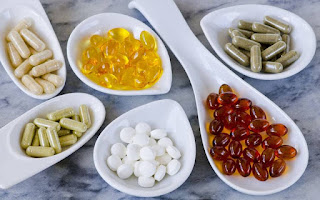Dietary Supplements
Vitamins and minerals are key nutrients that your body needs to survive and stay healthy. Vitamins help your body grow and work the way it should. Some help to resist infections and keep your nerves healthy, while others help your body obtain energy from food or help your blood to clot properly. By following proper dietary guidelines, most of these will come from food. Similarly, minerals also help your body to function. Minerals are elements that our bodies need to function that can be found in the earth and in foods. Some, however, are only needed in small quantities. Just like with vitamins, eating a varied diet will help you get enough of most minerals.
Getting nutrients from food is always the better option, but getting vitamins and minerals from a pill is always an option. Most older adults get all of the nutrients they need from food, but if you aren’t sure, talk with your doctor or dietician. They may recommend a dietary supplement or vitamin.
It is important to be aware that some supplements can have side effects such as negative reactions with some medications, increased risk of bleeding after an injury, or changes in your reaction to anesthesia during surgery. If you do need to supplement your diet, your doctor or pharmacist will inform you of which supplements and doses are safe for you.
When looking for supplements, you may be overwhelmed by the number of choices. Look for a supplement that contains the vitamin or mineral you need without a lot of other unnecessary ingredients. Read the label and make sure the dose is not too large. Your doctor or pharmacist can recommend a brand that fits your needs.
Key Vitamins and Minerals for People over age 51:
● Vitamin A: This can be found in
products such as eggs and milk. It can also be found in fruits and vegetables,
like carrots and mangoes
● Vitamin B1: This can be found in
meat, especially pork and fish, and it can be found in whole grains and some
fortified breads, cereals, and pastas
● Vitamin B2: This vitamin is found in
eggs and organ meat along with green vegetables.
● Vitamin B3: This is found in some
nuts, grains, and legumes. It is also located in poultry, beef, and fish.
● Vitamin B6: This vitamin can be
found in a variety of foods, but the richest sources are fish, beef liver,
potatoes (and other starchy vegetables), and fruit (excluding citrus).
● Vitamin C: Citrus fruits, tomatoes,
and potatoes are the best ways to obtain this vitamin.
● Calcium: This mineral is essential
for strong bones and teeth and can be found in dairy products, dark leafy greens,
sardines, and salmon.
● Vitamin D: You can find this vitamin
in fatty fish, fish liver oils, fortified milk products, and fortified cereals.
● Vitamin E: This vitamin can be found
in peanuts, almonds, and certain vegetables.
● Potassium: Many foods contain potassium
including fruits, vegetables, meats, and dairy foods. Apricots, lentils, and
potatoes are especially good sources of potassium.
If dietary supplements are not for you, remember that different foods in each food group have different nutrients. Picking an assortment within every food group throughout the week will help you to get more nutrients. The variety of foods will also make your meals more interesting. If you are interested in an alternate route, consult your doctor or dietician. The most important thing is that you are getting the proper vitamins and minerals needed to keep your body safe and healthy.
At Elder Law of Omaha our passion for seniors and their care is top priority. If you have questions about estate planning or how to plan for long term care and the future, then please give us a call to set up your complimentary 30-minute consultation at 402-614-6400. Visit our website at www.ElderLawOmaha.com.

Comments
Post a Comment